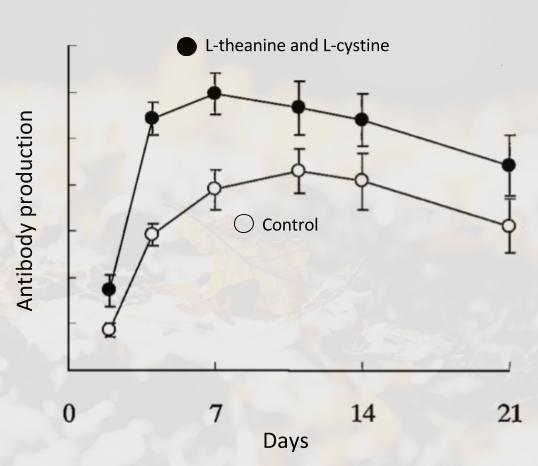 L-theanine is a non-essential amino acid, the only known dietary source of significance being tea. L-cystine is a non-essential amino acid found in all protein foods. Both L-theanine and L-cystine have antioxidant effects in humans and animals. For cystine, this may relate to its reduction to L-cysteine, and the incorporation of this reduced form into the cellular antioxidant glutathione (GSH; L-glutamyl-L-cysteinyl-glycine). L-theanine may act directly as an antioxidant. Antioxidants may provide benefits to the immune response, and this may be particularly the case in the ageing individual. Evidence suggests that as we age there is a cellular reduction in the levels of glutathione due to reductions in the synthesis rate. Supplementation with nutrients that improve glutathione production may therefore increase antioxidant defences and this may benefit immunity. There is evidence that consuming L-cystine and L-theanine together may have particularly beneficial effects on the immune response in animals.
L-theanine is a non-essential amino acid, the only known dietary source of significance being tea. L-cystine is a non-essential amino acid found in all protein foods. Both L-theanine and L-cystine have antioxidant effects in humans and animals. For cystine, this may relate to its reduction to L-cysteine, and the incorporation of this reduced form into the cellular antioxidant glutathione (GSH; L-glutamyl-L-cysteinyl-glycine). L-theanine may act directly as an antioxidant. Antioxidants may provide benefits to the immune response, and this may be particularly the case in the ageing individual. Evidence suggests that as we age there is a cellular reduction in the levels of glutathione due to reductions in the synthesis rate. Supplementation with nutrients that improve glutathione production may therefore increase antioxidant defences and this may benefit immunity. There is evidence that consuming L-cystine and L-theanine together may have particularly beneficial effects on the immune response in animals.

Co-administration of L-theanine and L-cystine has been shown to reduce the incidence of the common cold in human subjects. Not only did L-theanine and L-cystine reduce the number of days on which an infection was present, they also reduced the number of individuals infected on most days. This may relate to the antioxidant effects of the amino acids, which may support the immune response. Individual consumption of the compounds may not show the same effects, although this data is based primarily on animal studies. The immune enhancing effect of L-theanine and L-cystine has also been demonstrated in mice. Antibody production in mice has been shown to be significantly enhanced by co-administration of L-theanine and L-cystine (Picture from Takagi et al., 2010).
For example, co-administration of L-cystine and L-theanine for 14 days before immunisation with an influenza in elderly mice significantly increased the blood levels of two important immunoglobulins, IgM and IgG. This suggests that the L-theanine and L-cystine significantly improved one aspect of the immune response. In younger mice, co-administration of L-theanine and L-cystine significantly reduced the viral infection of lung tissue after infection with the influenza virus. Co-administration of L-cystine and L-theanine may also be effective against infection in humans. Male subject who received 175 mg of L-cystine and 70 mg L-theanine per day had a significant reduction in the risk of being infected with a common cold compared to a group of subjects taking a placebo tablet. Interestingly, it has been reported that the combination of L-theanine and L-cystine is required for the immune boosting effects, and that neither nutrient in isolation has the same biological effects.
Eat Well, Stay Healthy, Protect Yourself
RdB
Takagi, Y., Kurihara, S., Higashi, N., Morikawa, S., Kase, T., Maeda, A., Ariska, H., Shibahara, S. and Akiyama, Y. 2010. Combined administration of L-cystine and L-theanine enhances immune functions and protects against influenza virus infection in aged mice. Journal of Veterinary Medical Science. 72(2): 157-165
Kurihara, S., Hiraoka, T., Akutsu, M., Sukegawa, E., Bannai, M. and Shibahara, S. 2010. Effects of L-cystine and L-theanine supplementation on the common cold: a randomized, double-blind, and placebo-controlled trial. Journal of Amino Acids, 2010. Article ID 307475
